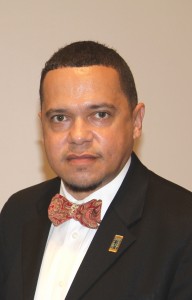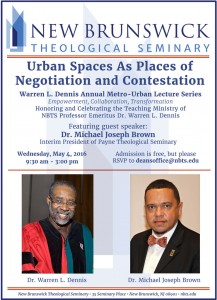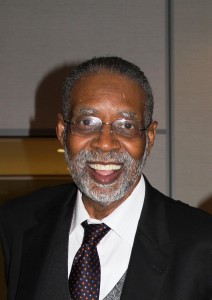
News

- This event has passed.
The Warren L. Dennis Lecture – 2016
May 4, 2016 @ 9:30 am - 3:00 pm
Event Navigation
The New Brunswick Theological Seminary
Warren L. Dennis Annual Metro-Urban Lecture Series
Empowerment, Collaboration, Transformation
Honoring and Celebrating the Teaching Ministry of Dr. Warren L. Dennis

Please join us for The Warren L. Dennis Lecture on May 4, 2016; Our guest speaker will be Dr. Michael Joseph Brown, Interim President of Payne Theological Seminary. The title of the lecture will be: “Urban Spaces As Places of Negotiation and Contestation.”
Admission is free, but please RSVP to deansoffice@nbts.edu.
About the Warren L. Dennis Annual Metro-Urban Lecture Series
The New Brunswick Theological Seminary Warren L. Dennis Annual Metro-Urban Lecture Series is intended to help revitalize the study and practice of urban ministry in theological education in North America.

Programs for urban ministry in theological education have often focused on specific skills or strategies that define cities in terms of their deficiencies. Cities have been seen as places of poverty, violence and oppression that are in need of outside intervention in the form of missions or evangelism. The work of churches, other religious institutions, communities and the broader context of urban life (corporations, financial institutions, hospitals, entertainment, legal systems and law enforcement, universities, transportation system, etc.) have too often been ignored in these educational models. As a result, many of the traditional approaches to urban ministry in theological education have become increasingly ineffective.
Institutions of theological education must establish an urban ministry body of knowledge that connects faculty, students and pastors to the systemic realities and challenges faced in our inner city neighborhoods. The Warren L. Dennis Metro-Urban Lecture Series will strive to develop new models for urban learning and leadership training, and to provide new resources for teaching urban ministry in theological education that reflect more inclusive concerns and commitments. The lecture series will challenge seminaries to assume greater public responsibility for helping urban congregations and other private and not-for-profit institutions shape the character of effective urban ministry in this new century.
Our goal is to raise $50,000 that would yield a 5% draw down to support program administration and speaker expenses. Currently, $22,000.00 in cash and $2,225 in pledges have been raised.
Current Situation
Urban ministry – as a field of study and practice in theological education in North America – is facing a crisis. For more than two generations, the field has been inordinately influenced by conceptions of the city that have been shaped in the modern industrial era. Cities have often been seen as “unheavenly” places and urban life as fundamentally dysfunctional. The city, consequently, is often viewed primarily as a mission field. Some have come to identify urban ministry as a ministry and mission to the marginalized, minoritized, poor or disenfranchised sectors of the city, be it in the form of evangelism or as work for liberation and justice. In a number of instances, urban ministry is synonymous with African American and/or Latino ministries, giving rise to excellent contextual theological reflection and practice, but failing to engage the fuller horizons of the contemporary urban experience.
Programs for urban ministry in theological education have often focused on specific skills or strategies that define cities in terms of their deficiencies. Cities are often seen as places of poverty, violence, and oppression that are in need of outside intervention in the form of missions or evangelism. The life and work of churches and other religious institutions and communities that are already located in the city, from the “tall-steeple” to the “store-front” churches (to say nothing of the mosques, synagogues and temples), have too often been ignored in these educational models. Equally ignored have been the numbers of people in cities who do not identify with a specific faith community or those who identify with one but whose spiritual life does not conform to more traditional religious institutional patterns. The wider context of urban life, with its financial institutions, corporate offices, medical institutions, museums, theaters, sports arenas, restaurants, night clubs, wifi cafes, universities, government agencies, police departments, courthouses, prisons and complex transportation systems, has also been ignored both theoretically and practically. The relationship between urban, suburban, exurban and rural contexts has escaped analysis in many of these efforts.
With the emergence of a new urban reality in the form of the “post-industrial,” “post-modern” or “post-colonial” global city, the theoretical and practical shortcomings of these efforts have become even more pronounced. As a result, many of the traditional approaches to urban ministry in theological education have become increasingly ineffective and, in too many instances, theoretical engagement with the city has been marginalized within the academic curriculum.
The Program
The annual lecture series is not simply one more academic conversation about urban ministry. It reflects the post-World War II development of the urban ministry movement that is more collaborative and confessional, attempting to change pedagogical practices in seminaries, churches and communities. Building on this pedagogical history of urban ministry, our aim is to discern the emerging curricula for community-based spiritual formation and public participation in theological education programs.
We will explore the theological reality of the empowerment of people victimized by systemic oppression, violence, fear, and alienation to speak to the realized presence of God’s affirming acts in their lives. These are the people Howard Thurman speaks of “having their backs against the wall.” They are willing to collaborate with the academy and the church on common missional concerns and have put into practice the spiritual teachings of the community.
The central premise we will explore is the need to bridge the gulf between learning, faith, and practice by implementing faith commitments through public engagement in the academy, church and community. Across the North American theological enterprise, a conversation is taking place about faith and public participation. The conversation is about teaching and learning, curricula development, credentialing and the economic wellbeing of the community. In some cases, the conversation is within seminaries around the classical argument of theology and practices. In other instances, the conversation is an interdenominational and interfaith postmodern discussion focused on expanding urban theological education beyond the traditional boundaries to discern the best content and teaching practices for urban ministry.
Urban ministry advocates in this conversation challenge seminaries to assume greater public responsibility for helping urban congregations and other private and not-for-profit institutions shape the character of effective urban ministry in this new century. In order to do so, seminaries require critical thinking, constructive ideas, collaborative models and courage.
Outcomes
The Warren L. Dennis Metro-Urban Lecture Series will strive to develop new models for urban learning and leadership training, and to provide new resources for teaching urban ministry in theological education that reflect more inclusive concerns and commitments.
The lecture series will introduce participants to the question of theological education inherent in curricula, to blend theory and practice in urban situations, and to examine the problem against the background of the urban landscape that gives rise to the inability of the academy and the urban church to address the crisis of spirituality and pedagogy in urban communities.
Two critical questions are addressed throughout: Is the current paradigm of theological education the most effective for urban church revitalization and the transformation of urban communities? And, how do seminaries cultivate leaders to mobilize and empower urban communities to be self-defining and self-reliant?
Partners and Collaborators
In order for theological education to engage beyond its traditional walls of education into practical arenas of the 21st century, it must be open to new dialogical partners.
Each year, the lecture series will connect New Brunswick Theological Seminary (NBTS) with select partners in the planning and design of the lecture to generate a unique gathering of faculty, students, pastors, congregations and members of the community. In addition to an urban pastor whose congregation has contributed significantly to understanding and being involved in the changing landscape of inner-cities, partners may include community groups, government organizations, corporations, hospitals and other urban institutions.
Administration
Current and former students of Dr. Dennis established the Warren L. Dennis Lecture in Metro-Urban Ministry Endowment to ensure his legacy lives on in a new and tangible way.
The speaker each year will be invited by the President of NBTS, following the nomination of the speaker by the current holder of the Dirk Romeyn Professor of Metro-Urban Ministry chair and approval by the Faculty Council. At each event, scholars from disciplines that are outside the traditional walls of theological education who are working on urban studies and religion will also be considered.
The endowment is administered by the New Brunswick Theological Seminary Development Department. (Contact: Cathy Proctor, Director of Development, cproctor@nbts.edu). Click here to donate to the endowment.
About Dr. Dennis
Dr. Dennis, on the occasion of his retirement in May 2015, was honored with a resolution from the Seminary Board of Trustees naming him Professor Emeritus of New Brunswick Theological Seminary. Dr. Dennis served as The Dirk Romeyn Professor of Metro-Urban Ministry and Director of Doctoral Ministry at NBTS from 1992-2015. He developed an urban concentration in NBTS’ Master of Theological Studies and Master of Divinity degree programs, and he established the first Doctor of Ministry in Metro-Urban Ministry degree for professional clergy development. He is an ordained minister in the Presbyterian Church USA.
